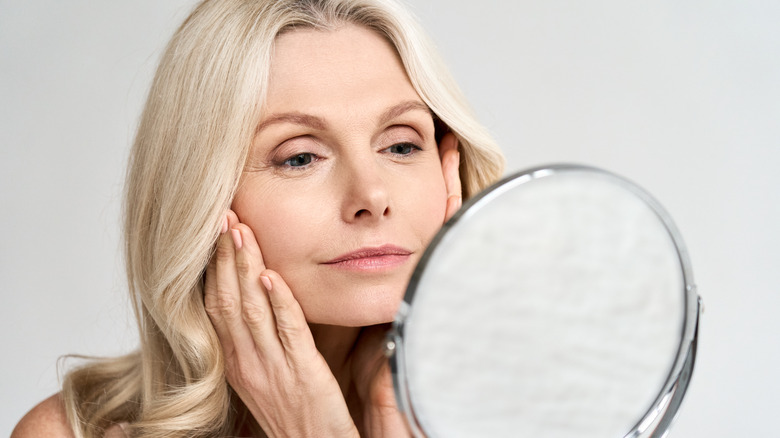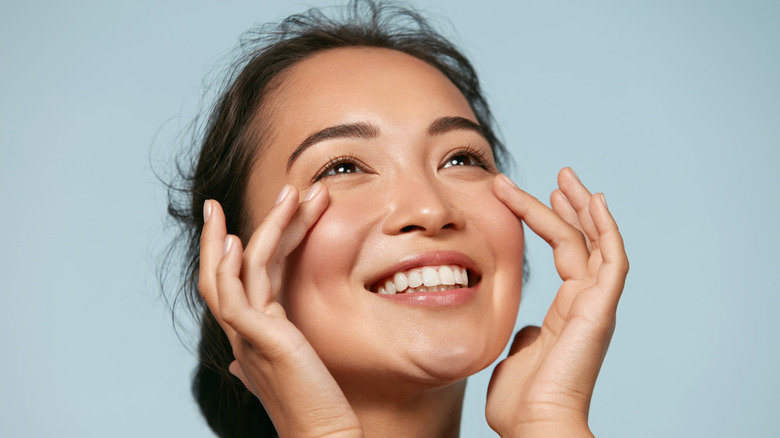Here's What You Need To Know Before Doing A Skin Detox
The trend of "detoxing" our bodies has been around for centuries, but it has picked up new steam in the past few years and now seems inextricably linked to diet culture and wellness culture (via Harvard). While it may sound like a healthy and positive thing to "detox," which simply means "removing toxins from the body" (via Healthline), whether or not drinking certain drinks or using certain products or buying certain "cleanses" actually removes anything but money from our wallets is a pretty debatable issue.
As such, while many skincare products and aesthetician services are hopping on the detox bandwagon and promising to help "detox" your skin the way diets and pills promise to detox your body, there are a few things you should be absolutely clear about before you invest money, time, or expectations into anything that promises to detoxify your skin. Sure, some of these things might actually make your skin look or feel better, but are they actually living up to the detoxifying claims?
Can skin be detoxed?
Your body already has a pretty impressive system for removing toxins and keeping you as healthy and safe as possible; your lungs, liver, kidneys, and colon all have the ability to remove toxins and "cleanse" themselves (via Healthline). While habits like smoking cigarettes or drinking alcohol excessively can cause lasting damage because you are putting more toxins into your body than these systems can fully and safely eliminate, the answer in those cases is to stop those habits, not go on a juice cleanse. Yet, the diet and "detox" industry rakes in countless dollars promising to undo damage and pull more toxins out of your body than your organs can do on their own.
While your skin is an organ and absolutely does and can pick up dirt and grime from your everyday living, the idea that you can "detox" it, rather than simply clean it and protect it, is a false one. As Dermatologist Dr. Fayne Frey tells Healthline, "There's no such thing as skin detox from a medical perspective." The solution, instead, is to cleanse it well and safely, and to protect it from environmental hazards like sun damage and poor nutrition or bad habits like smoking, which can damage the outer layer of the dermis. "When people talk about 'detoxing the skin,' it's more about what you can do to the surface to protect your skin from the outside environment more so than clearing out what's on the inside," says Dr. Ross Perry.
How to better protect and "feed" your skin
While products like a charcoal mask may actually make your skin look brighter and feel cleaner, it's because it simply helped to remove dead skin cells or grime that can clog pores; it hasn't actually "drawn toxins out of your body," as your skin does not, for the most part, eliminate toxins through the skin (via Healthline). As Harvard Health explains, the best thing you can do for your body is to simply give it what it needs to do what it does naturally, meaning eat healthy foods, drink plenty of water, avoid excess alcohol or smoking.
With regard to your skin, it's the same: cleanse it gently and thoroughly (and there's nothing wrong with that charcoal mask or a professional exfoliation as long as they are well tolerated and not overused) via Healthline. And protect it by using a high quality sunscreen.
There is, however, one situation in which the words "skin detox" make medical sense, and that is if you are using a ton of products and notice that your skin is becoming irritated, or if you are using a prescribed product like a steroid cream and notice it is no longer working, these are good times to give your skin a break from these products for a while. This will allow the skin to heal and to become more receptive to other treatments in the future. In this case, "detox" means "stop adding things," not "try to extract things."


